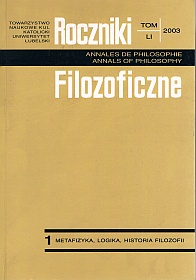Tomizm analityczny
Abstrakt
The term „analytical Thomism” was coined by John Haldane of the University of St. Andrews (Scotland). Haldane characterizes analytical Thomism as „a broad philosophical approach that brings into mutual relationship the styles and preoccupations of recent English-speaking philosophy and the concepts and concerns shared by Aquinas and his followers.” In addition to Haldane, the most prominent philosophers, whose philosophical training and general philosophical perspective are rooted in English-speaking analytical philosophy but who are very much interested in the thought of Thomas Aquinas include: Peter Geach, Elisabeth Anscombe, Anthony Kenny, Norman Kretzmann, Brian Davies, Scott MacDonald, Eleonore Stump, and Christopher Martin.
In the first part of the paper I consider the question whether it is possible to be both a Thomist and an analytic philosopher. I set forth reasons why the alliance between the two views does not seem to be possible and I try to make clear that such impressions are often based on misconceptions. In fact, I try to show in the paper that the alliance between Thomism and analytic philosophy may prove beneficial for both sides.
The goal of the second part of the paper is to present some specific problems characteristic of contemporary analytic philosophy and to show how they are approached from a Thomistic perspective. First of all, I present Robert Pasnau's analysis of Aquinas' position on the nature of human thinking. I also argue that Aquinas' account of our knowledge of our own mental states can be an attractive alternative to currently still popular models of self-knowledge as a type of perception. On the latter accounts, introspection, which is a very special type of causal mechanism, reliably produces corresponding second-level beliefs or judgments about our first-level mental states. In this special type of observation no intermediate and fallible organ of perception is involved, and this is what guarantees the truth of second-level statements.
The principal problem facing such inner sense accounts of self-knowledge is that they do not provide us with a satisfactory explanation of why a causal mechanism should always produce true statements in the case of knowledge of mental states where similar mechanisms sometimes fail in the case of external perception. It is exactly at this point, as we shall see, that Aquinas' reflective model of self-knowledge turns out to be attractive.
Bibliografia
Brentano F. (1969), The Origin of our Knowledge of Right and Wrong, New York: Humanities Press.
Brentano F. (1874), Psychology from an Empirical Standpoint, London–New York: Routledge & Kegan Paul.
Copleston F. (1976), Thomas Aquinas, London: Search Press London.
Evans G. (1982), Varieties of Reference, Oxford: Clarendon Press.
Fodor J. (1975), The Language of Thought, Cambridge Mass.
Gibbs Th. (2002), The End of Thought. The Life and Times of an Analytic Philosopher, „The Weekly Standard”, lipiec 2002, s. 31-33.
Goldman A. (1994), Naturalistic epistemology and reliabilism, w: Philosophical Naturalism, red. P.A. French, T.E. Uehling, H.K. Wettstein, „Midwest Studies in Philosophy”, vol. 19, Notre Dame, Ill.: University of Notre Dame Press, s. 301-320.
Hadot P. (1995), Philosophy as a Way of Life, Oxford UK, Cambridge USA: Blackwell Publishers.
Haldane J. (1993), Mind-World Identity Theory and the Anti-Realist Challenge, w: Reality, Representation and Projection, red. J.Haldane, C.Wright, Oxford: Oxford University Press, s. 15-37.
Haldane J. (1995), Analytical Thomism, w: The Oxford Companion to Philosophy, Oxford University Press, s.125.
Haldane J. (1999a), Analytical Philosophy and the Future of Thomism, „Cogito”, vol. 13, no. 1, s. 45-48.
Haldane J. (1999b), Thomism and the Future of Catholic Philosophy, „New Blackfriars”, vol. 80, no. 938, s. 170-171.
Haldane J. (1999c), Vocation of Philosophy, wykład w The Thomistic Institute.
Jenkins J. (1991), Aquinas on the Veracity of the Intellect, „The Journal of Philosophy”, vol. 88, no. 11, s. 623-632.
Kenny A. (1980), Aquinas, Oxford: Oxford University Press.
Kenny A. (1993), Aquinas on Mind, London–New York: Routledge.
Kenny A. (2001), Time Literary Supplement (TLS), 5 października, s.14.
Lisska A. (2002), Beyond Neo-Thomism: Recent Work in the Philosophy of Thomas Aquinas, wykład St. Thomas Aquinas Lecture w Providence College.
MacDonald S. (1993), Theory of Knowledge, w: The Cambridge Companion to Aquinas, red. N. Kretzmann, E. Stump, Cambridge, s. 160-195.
McGinn C. (2002), The Making of a Philosopher, New York: Harper Collins Publishers.
Pasnau R. (2002), Thomas Aquinas on Human Nature, Cambridge: Cambridge University Press.
Ramsay H. (1999), Thomism and the Future of Catholic Philosophy, Responses, „New Blackfriars”, vol. 80, no. 938, s. 195-199.
Searle J. (1998), Mind, Language and Society: Doing Philosophy in the Real World, New York: Basic Books.
Shanley B. J., OP (1999), Analytical Thomism, „The Thomist”, vol. 63, s.125-137.
Theron S. (1997), Resistance of Thomism to Analytical and Other Patronage, „The Monist”, vol. 80, no. 4, s. 611-618.
Copyright (c) 2003 Roczniki Filozoficzne

Utwór dostępny jest na licencji Creative Commons Uznanie autorstwa – Użycie niekomercyjne – Bez utworów zależnych 4.0 Międzynarodowe.





